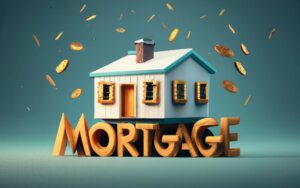What is mortgage ?
One kind of financing used to buy real estate, usually a house, is a mortgage. A financial organization (such a bank or mortgage lender) loans you the money you need to purchase the property, and the property itself acts as security for the loan when you take out a mortgage. This implies that the lender may pursue a legal procedure known as foreclosure to seize ownership of the property if you are unable to make the required mortgage payments.

The following are important things to know about mortgages:
1.Loan Amount: The loan amount you are given is usually expressed as a principal percentage of the purchase price of the property.
2. Interest Rate: The cost of borrowing money is reflected in the interest rate associated with mortgages. The loan term’s interest rate may be fixed, meaning it stays the same, or adjustable, meaning it fluctuates depending on the state of the market.
3. Loan Term: The amount of time you have to pay back a mortgage is fixed, usually for 15, 20, or 30 years. The amount of your monthly payments is determined by the term.
4. Regular Monthly Payments: Principal and interest are often included in your regular monthly payments. Certain mortgages further incorporate homeowners insurance and property taxes into the monthly payment (referred to as an escrow account).
5. Down Payment: A down payment, which is a portion of the home’s purchase price, is normally required when buying a property with a mortgage. The terms of the mortgage may change depending on the amount of the down payment.
6. Qualifications: You must fulfill specific income and credit standards in order to be eligible for a mortgage. To decide if you qualify for a loan and at what interest rate, lenders will consider your income, credit history, and other variables.
7. Mortgage Types: Conventional mortgages, FHA loans, VA loans, and USDA loans are among the different types of mortgages. Each has certain requirements and conditions.
8. Closing Costs: When you finalize the purchase of a home with a mortgage, you’ll incur various fees, known as closing costs, which cover expenses like loan origination fees, appraisal costs, and title insurance.
Types of Mortgage
- Fixed-Rate Mortgage (FRM): The interest rate on a fixed-rate mortgage doesn’t change over the course of the loan. It is now simpler to budget because your monthly principal and interest payments will stay the same. The most common lengths for fixed-rate mortgages are 15 and 30 years, but there can be more alternatives.
- Adjustable-Rate Mortgage (ARM): The interest rate on an adjustable-rate mortgage, sometimes referred to as a variable-rate mortgage, is subject to periodic adjustments, typically following an initial fixed-rate period. Although the starting rate is frequently less than that of a fixed-rate mortgage, it is subject to change in response to changes in the market interest rate.
- Interest-Only Mortgage: When you have an interest-only mortgage, you initially only have to pay interest for a set amount of time—usually five to ten years. Following the interest-only period, principal and interest are due. Lower beginning payments are possible with this kind of mortgage, but later payments could end up being greater.
- Balloon Mortgage: For the first few years (usually five to seven years), a balloon mortgage offers lower monthly payments; however, the entire loan balance is payable in one lump sum at the conclusion of the term. In order to pay the balloon payment, borrowers frequently sell their real estate or refinance.
- FHA Loan: These mortgages are intended for borrowers with low to moderate incomes and are insured by the Federal Housing Administration (FHA). They could have more accommodating credit standards and usually demand a smaller down payment.
- VA Loan: Veterans, active-duty military members, and select members of the National Guard and Reserves may apply for VA loans, which are insured by the US Department of Veterans Affairs. VA loans frequently don’t need a down payment.
- USDA Loan: For qualified buyers of rural and suburban properties who satisfy specific income and property location standards, the U.S. Department of Agriculture (USDA) provides loans. Usually, there is no down payment needed for USDA loans.
- Jumbo Loan: A jumbo mortgage is a loan that is larger than the conforming loan restrictions set by Freddie Mac and Fannie Mae, two government-sponsored organizations. These loans are frequently used to purchase expensive homes, but they may have higher credit standards and call for a greater down payment.
- Reverse Mortgage: With a reverse mortgage, senior homeowners can turn their home’s equity into cash without having to sell it. Usually, repayment is deferred until the homeowner vacates the property or dies.
- Conventional Loan: A government entity does not guarantee or insure a traditional mortgage. Compared to government-backed loans, it frequently has stricter credit requirements and a larger down payment.
- Interest-Only Mortgage: With these mortgages, interest-only payments are possible for a predetermined amount of time—usually five to ten years. You will then begin making principle and interest payments.
- Bridge Loan: Short-term loans known as “bridge loans” are utilized to pay for the acquisition of a new house before the sale of an old one. They are frequently employed to prevent gaps in time between the purchase and sale of real estate.
The sort of mortgage that best meets your needs will depend on a number of factors, including your financial condition, your future goals, and your risk tolerance. Furthermore, depending on the lender and the area, certain mortgage kinds may not be available to you or may have different terms.
TOP 10 Loan Companies in USA
